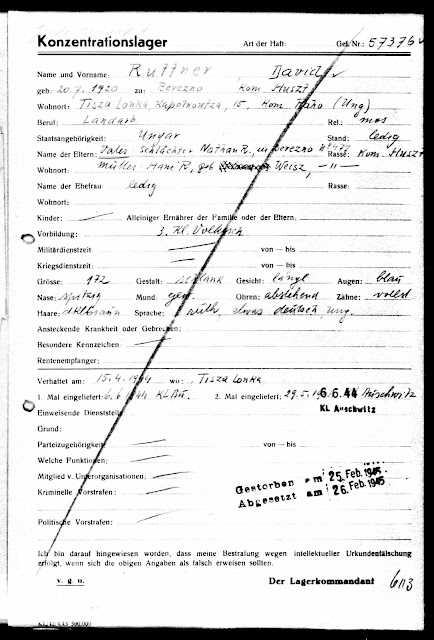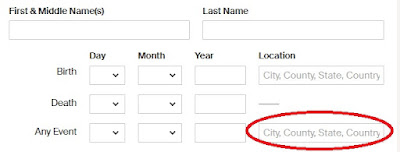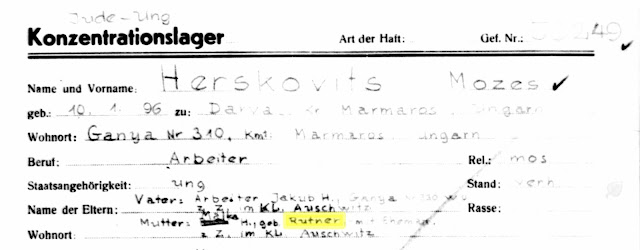Ancestry has a collection of records from concentration camps. These records can help you learn the fate of relatives, or at least where they were for a period of time during WWII. Some also have significant genealogical information--parents' names, spouses names (with maiden names for the mother and spouse, when applicable), and at times there are photos. Not everyone who was in a concentration camp has records included in this collection (especially those who were murdered upon arrival), but many are.
While searching just for surnames can help you locate relatives, I've found that searching for town names--with some caveats--can often be even more powerful.
 |
| Concentration Camp Intake Form; David Ruttner (my 4th cousin twice removed) |
While it was relatively easy to find records for relatives with specific surnames (like the intake form above for David Ruttner in Buchenwald, above), sometimes searching for towns where my family members lived, especially for smaller towns, helped me to identify additional relatives. But there are some tricks to find the relatives' records in this way in this data set.
 |
| This is the field we're discussing |
- You want to search from the data set itself, rather than all records. You can find that here.
- In the "Any Event" field, use the "Location" field, as seen in the image above.
- Try your town's name here. But an important thing to know--it will only find exact matches. So it's easy to miss records. So try the following strategies for the town name to try to find the most relatives:
- Search with as many variations of the town name as possible.
- Don't just use the English spelling. For example, searching for "Warsaw" (English spelling) finds only one match. Searching for "Warszawa" (Polish spelling) finds 198 matches. And searching for "Warschau" (German spelling) finds 9572 entries!
- Search for spelling mistakes. Searching for "Warschaw" finds two additional matches not found by any of the above.
- Search for possible transcription mistakes. Searching for "Marschau" finds 9 entries, some of which are actually Warschau.
- Wildcards work, but not like you'd expect. Search for "*arschau" finds 16 entries, where the town name was indexed in ways like "??arschau."
- For larger towns (like "Warschau"), you can then add in things like surnames to try to cut down on matches. But for smaller towns like where my families mostly originated, it's worth looking at all of the matches. Sometimes you'll recognize a (not indexed) mother's maiden name or a (also not indexed) spouse's name.
 |
| Mozes Herskovics' Concentration Camp Intake Form |
As an example, I searched for my family's town of Darva (also known as Kolodne--so yes, I searched both names). I never would have done a Herskovits-specific search, but searching for Darva found a form for a Mozes Herskovits. I looked at the form and discovered that his mother was Malka Rutner--and realized that this Mozes was my fourth cousin twice removed. I'd already had his birth record, but this record told me his wife's name and tells me that before he was deported, he'd lived in the town of Ganya. That allowed me to find his children's birth records. Mozes Herskovits is such a common name (especially in this area), that I'd never have known that the Mozes and Helena in Ganya were my relatives, but this record tipped me off to that fact.
Doing Holocaust research is never easy (both relatives whose documents you see above were murdered). But it's a way to remember them--or sometimes (rarely but sometimes!) find some who survived.
If you find any other ways to make use of this record set, please comment below!
You can like my page on Facebook:or follow @larasgenealogy on Twitter.

Thank you, Lara for doing this task for so many of us, as powerfully sad it may be for many.
ReplyDeleteHi Lara - this is very useful, but it seems that records from Treblinka are missing. Would you know where/if such records are available?
ReplyDeleteIt looks like there are Treblinka records in the USHMM database as well as http://www.terezinstudies.cz/en/index.html and https://memoryoftreblinka.org/the-names-of-the-victims/description-of-the-database/ as a start.
Delete